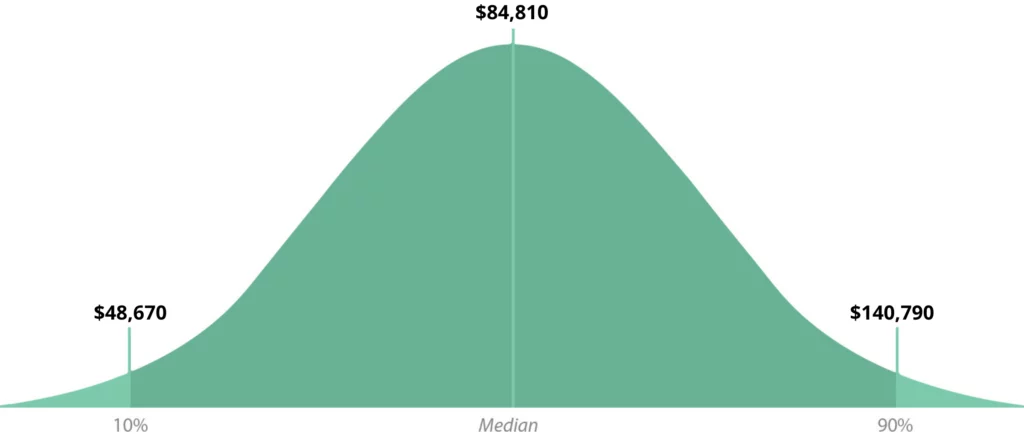
1. Overview: Job Responsibilities, Salary, and Common Requirements
2. A Comprehensive Guide to Becoming an Operations Research Analyst
3. What Are the Tasks of a Research Analyst?
4. Signs You Should Consider Becoming an Operations Research Analyst
5. How Do You Become an Operations Research Analyst?
6. What Skills Do Research Analysts Have?
7. Popular Schools and Colleges in the U.S. for Aspiring Operations Research Analyst
8. How to Get a Job as an Operations Research Analyst
9. Learn About Geographic and Location Pay Differentials
10. Make Your Resume Stand Out
11. Interview Questions for Research Analysts
12. Top Online Courses for Aspiring Operations Research Analyst
Operations research analysts made a median salary of $84,810 in 2019. The best-paid 10 percent made $140,790 that year, while the lowest-paid 10 percent made $48,670.


Economists
Industrial Engineers
Logisticians
Management Analysts
Mathematicians
Statisticians
Operational Researcher
Critical thinking
Problem-solving
Data mining
Mathematical modeling
Statistical analysis
Writing
Communication
Operations research analysts are hardcore problem-solvers. They help high-level executives come up with decisions based on the analyses and recommendations they provide. They use advanced level mathematical and analytical methods in their practice and are, therefore, highly intelligent people with excellent critical thinking skills.
The work of an operations research analyst is crucial in the success of many businesses and industries such as healthcare, manufacturing, finance, and a lot more. Their roles usually involve the following:
The decision to become an operations research analyst may come to you spontaneously in a random realization. It might also be something you’ve always wanted since you discovered your love for numbers. Either way, you know you are cut out for this type of job if you possess the following qualities:
Operations research analysis is a highly technical job that involves a ton of numbers. You have to be comfortable in dealing with statistical data and research figures daily. This is the reason why such professionals have strong foundations in quantitative fields such as mathematics, statistics, and analytics.
Analysts do a lot of problem-solving. It is at the very core of their responsibility. Since the problems they handle are often broad and multi-faceted, their approach to problem-solving is comprehensive and composed of a number of processes. They identify issues, break them down into components, and analyze each independently. For example, if an airline were to determine flight schedules and ticket prices, an analyst has to factor in connecting cities, fuel quantities, the number of passengers that are to be expected, cost of maintenance, prices of fuel, staffing costs, and maintenance.
To help them achieve accurate results, analysts use the aid of sophisticated computer software in their analysis and problem-solving. Some operations research analysts have degrees in computer science, and it comes in handy whenever they use statistical software, databases, and statistical packages to analyze and solve problems. This software enables analysts to simulate present and future situations, thus allowing them to plan for alternatives and see how different courses of action can have different outcomes.
Many analysts work in teams since the problems they handle are quite large and complicated. They team up with different experts on different fields that a problem touches on, and they also collaborate with teams who are responsible for implementing their recommendations. Having good team relationship skills is one of the determining factors of a project’s success, which is why an analyst needs to have good working relationship skills.
A problem, especially one that is large and multi-faceted, may sometimes need equally-complicated and unconventional solutions. As an analyst, you have to think of not just one but many ways to solve it. Creativity comes in useful for such situations so that you can come up with alternative actions that help you solve challenges innovatively. These solutions may not only be unconventional but also have to be realistic and feasible enough to achieve the desired results.
When dealing with large amounts of information, things can quickly get overwhelming. A good analyst can effectively sort and compartmentalize data in a way that is easy to process and digest. Also, dealing with vast information results in a lot of opportunity for error. Adopting a methodical or systematic approach in your processes ensures that everything is sorted and checked in every step of the way and that mistakes are kept to a bare minimum, if not entirely avoided.

Operations research analysis is a highly technical job wherein the stakes are usually high. Big corporations and top-level executives owe much of their success to the critical and analytical thinking of these professionals. To become such a professional, you have to achieve the following:
Analysts ideally complete a bachelor’s degree in operational research. However, many of these analysts have completed some relevant quantitative programs such as mathematics, statistics, analytics, computer science, or engineering. The job is highly technical in nature and thus requires such technical courses; however, courses in political science and economics are also beneficial since the roles and projects are often multi-faceted.
Although entry-level positions only require a bachelor’s degree, many corporations prefer applicants who have a master’s or a Ph.D. This is especially true for senior or manager level positions that put an analyst in charge of big teams and big projects. The role of the analyst is very crucial to the success of an organization that companies aim to hire only the best in the field.
Learning does not stop after graduate school. There are constant advances in technology that an analyst has to keep up with. Software tools may get updated every so often. Statistical, analytical, and research methods may get improvements as time goes by. The analyst has to make sure that the arsenal of tools he carries is not outdated and his skills and knowledge are relevant to the time.
There are some operations research analysts that came from the US army. As applicants, such cases may first need to undergo a background check and obtain security clearance before being considered for the job. This holds true for several federal employees, as well as employees in private sectors because, as an analyst, you will regularly encounter classified information.
Operations research analysts make use of high level mathematical and analytical methods to come up with solutions to problems in different fields. Their work is vital in the decision-making process of an organization as they provide data, analysis, and recommendations to top-level executives who base their decisions on the information that analysts offer to them. Below are some of the essential skills you need to possess in order to perform well in this job:
As with any profession that involves research and deals with data, operations research analysts need a broad knowledge of data gathering techniques. Much of your analysis will rely on the accuracy and relevance of the data you have. Knowing how to gather such relevant data and ensuring that they are accurate guarantee the success and reliability of your end-product analysis.
After collecting data, you are to organize, display, and interpret them to produce an analysis. While it may seem straightforward in theory, the process is a lot more involved in reality. It can have plenty of variations depending on the industry that you work in and the project that you undertake. A solid foundation on statistics and analysis helps analysts go through the process with ease and allows them to tackle each task with confidence.
Analysts use special types of software to aid them in their jobs. These software are vital tools in the performance of their task, which is why it is imperative that you know how to use and maximize them to their utmost potential.
You will touch base with different experts from different fields. You will be dealing with managers and top executives. You will also be going deep into the workforce departments down to the last employee. Therefore, your communication skills need not only be sharp but also adaptable enough to cater to different levels within an organization. This skill is especially useful when dealing with non-analysts or people who are not skilled in research. You have to be able to impart information in such a way that a non-researcher would understand clearly.
The most sought-after part of your analysis would be your recommendations. You have to present it in such a way that will engage your audience and make them fully understand the gist of your output. Having excellent presentation skills is essential because it enables you to put your work forward so that people can understand and appreciate it enough to put it into good use. Learning some basic PowerPoint is a great starting point that you can build up from.
While you might not be directly managing teams, you will undoubtedly be working with a lot of people, providing some form of leadership and instruction. A right amount of leadership skills can get you the results you want to achieve in terms of data gathering, research, data processing, documentation, and so on. Motivating people you work with is a useful skill since it allows you to work seamlessly between departments and makes others more likely to cooperate with you in helping you achieve your desired results.
There are several schools around the country who offer degree programs in operational research. If you are an aspiring operations research analyst and you want a solid foundation in operations research, these are some of the most popular schools that might be near you:
If you want to level up your knowledge base and get a Masters in Operations Research, these are the schools you may consider:

With a job outlook of 25%, according to the Bureau of Labor Statistics, operations research analysts are some of the most in-demand professions out there. If you would compare it to all other occupations which have an average job outlook of 5%, you would soon realize that, given the right prerequisites and skills, you can easily land a job. Here are some of the ways you can get it:
You might be pleased to discover that the federal government hires operations research analysts for several departments, such as the military. USAJOBS is the country’s official employment site. You can visit them if you want to start a career in the government.
However, if you are looking more towards the private sector, you can check out these job posting websites that commonly have this position available:
The Institute for Operations Research and the Management Sciences (INFORMS) is a leading international association for operations research and analytics professionals. It can open up new and exciting opportunities for you and your practice through networking with other fellow operations research analysts and other related occupations. It gives you a chance to connect and learn through their scheduled conferences and meetings, which are held in the US and everywhere else in the world.
There are many events and conferences you can attend where you can meet and rub elbows with potential employers. It may take some effort and a whole lot of research to find and get to these events, but if you make friends in high places, it could well be worth your time.
As a company grows and expands, it slowly develops a need for more complex solutions for its developing needs. Ultimately, the operations research analyst spot might open out of necessity, especially if operations are getting bigger and more complicated. Make sure to display your analytical skills early on and keep your skills and knowledge sharp and ready for any opportunity that may arise.
Operations research analysts are mostly well-compensated throughout the country, with the best paid amassing more than a hundred thousand dollars annually. If you want to know which states pay their analysts the best, take a look at the table below:
| State | 2019 Mean Annual Wage |
|---|---|
| New Jersey | $110,320 |
| New York | $104,890 |
| Virginia | $104,090 |
| Rhode Island | $103,710 |
| Maryland | $102,380 |
| Connecticut | $101,320 |
| California | $101,150 |
| Illinois | $100,010 |
| Washington | $97,870 |
| New Hampshire | $97,620 |
| Hawaii | $94,010 |
| Colorado | $92,640 |
| Minnesota | $91,820 |
| Alabama | $91,800 |
| Massachusetts | $90,960 |
| Oregon | $90,340 |
| Delaware | $89,580 |
| North Carolina | $89,390 |
| Arizona | $87,610 |
| Pennsylvania | $86,110 |
| New Mexico | $86,100 |
| Kansas | $85,920 |
| Michigan | $85,720 |
| Vermont | $84,590 |
| State | 2019 Mean Annual Wage |
|---|---|
| Texas | $84,500 |
| Ohio | $83,950 |
| Iowa | $82,440 |
| South Carolina | $81,130 |
| Missouri | $79,920 |
| Oklahoma | $76,420 |
| Nevada | $76,400 |
| Florida | $75,500 |
| North Dakota | $75,060 |
| Mississippi | $74,840 |
| Utah | $74,830 |
| Alaska | $74,620 |
| Louisiana | $72,540 |
| Indiana | $71,540 |
| Wisconsin | $71,300 |
| Maine | $71,250 |
| Montana | $70,110 |
| Kentucky | $70,100 |
| Tennessee | $69,980 |
| Georgia | $69,840 |
| Idaho | $69,450 |
| Arkansas | $62,900 |
| Nebraska | $59,470 |
| West Virginia | $52,720 |
Report from the Bureau of Labor Statistics
If you are eyeing a position in operations research analysis, here are some of the things you can do to make your resume more attractive to potential employers:
Since you are applying for a highly quantitative position, putting figures front and center in your resume makes an instant impression that you are someone who is fit for the job. Include numerical information like how many years you have been in the workforce, how many years of experience you have in the field, the number of significant projects you have worked on, percentages of your performance in past projects, and so on. Having numbers on your resume will make you stand out as someone who provides objective data as this paints a picture of just how comfortable you are in the realm of numbers.
What have you done? When did you do it? Who was involved? How did you make things better? You can answer these questions for every project you decide to enumerate within your list of accomplishments. This gives your employers an idea of your strengths and your experiences. It also gives them a glimpse of whether or not your achievements mirror that of what they wish to achieve within their own company.
Your educational background will lay the foundation of your strengths in the field. Even if you may not be a graduate of operations research, experience in business administration makes you a perfect fit for a business setting. Similarly, a background in computer science is a definite edge in the tech industry.
In your resume, under your information, you can provide a brief summary of your role as an analyst in your previous company. This gives your potential employer an idea of the scope of your responsibilities in your last job. It also gives them an idea of how much you can potentially take on in terms of liability.
When your resume finally manages to reel in a hiring manager, and you receive a call for an interview, here are some of the questions you can prepare for:
Give the interviewer a picture of how you get things done. It would be helpful if you have a system in place for every situation. Usually, a systematic approach works best in this type of work. It ensures that nothing is missed and testifies little margin for errors. The more organized you are in your system, the better. Don’t forget to say how you go about your priorities. It speaks of the things that matter most to you in your daily tasks.
This is a highly technical question that only someone with a background in this field can answer. It gives a great look at your skills and experience as an analyst and shows them an idea of what you have to offer if they choose you for the job. Highlight the things that have worked out well for you and the ideas that you think have great potential along with why you are optimistic about them.
Presenting to non-analysts and non-researchers is one of the main tasks you are about to encounter in this position. You should be able to impart complex analytical data in terms that are easy to understand. When sharing your experience, include the response of your audience or the end-result of your experience. Did everyone verbalize that they appreciated your presentation? Were they able to apply the information you shared with ease and confidence? Were there a lot of questions asked during your presentation? What is the nature of those questions?
As an analyst who makes recommendations, it is only expected that there will be times when your proposals will be rejected. Your employer wants to know if you can respond to these situations in a professional manner. If you think your idea warrants a second chance, how did you come around asking for a reconsideration? Did you display persuasion and the right bargaining techniques? Were you persistent enough without crossing the line?
This question aims to let your hiring manager what are the things that you think matter the most in the said role. Is it the analysis? The research models? The software? The collaboration? There can be so many factors that you can consider relevant to you as an aspiring analyst. Try to think deeply about what you think is important, not just for you but for the company that you are applying for. Doing some background checks on the company is a good idea as this may give you some helpful ideas on what you can do to help them out.
This question aims to uncover your creativity and ingenuity. Don’t forget to answer the second half of the issue, which asks you how your idea helped out. It is essential that the idea that sprung from your creativity was feasible enough to help out and work. You might be caught off-guard when faced with this question unprepared, so prior to the interview, make sure you look through your old work files so you can recall the past accomplishments that you can highlight to the interviewer.
Sharpen your skills in Operations Research Analysis by taking these top online courses
Operations Research Analysts are well-rounded professionals that not only deal with numbers and figures, but also touch on other aspects of different industries. Therefore, they should have skills that are not limited to the quantitative field but also other skill areas such as communication, critical thinking, computer science, and finance.
Here are some top courses that can help you brush up on your skills to become the best operations research analyst that you can be:






